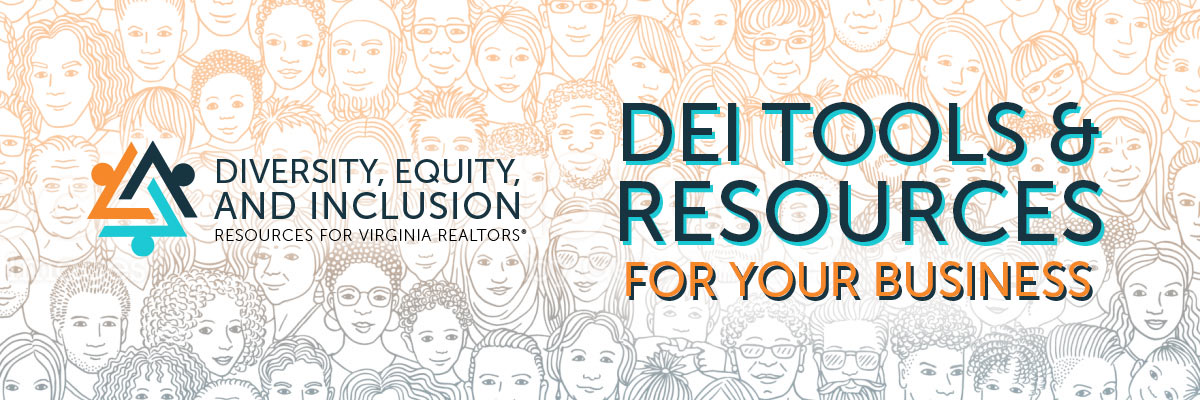Tools to Make Your Business More Diverse, Equitable, and Inclusive
January 19, 2023

It’s a new year and the housing market continues to evolve. In order to be successful in this industry, you need to diversify your business practices to reach everyone in your area. We have some tools for you to keep in mind throughout the year (and to save to come back to!) so you can continue to be inclusive in your business and everyday life.
Stay Up to Date in Changes in Migration, Homeownership Gaps, and Demographics of Your Area
According to the 2010 and 2020 U.S. Census Reports, the percentage of those in the population selected “White Alone” as their race decreased by 8.6% in the United States and decreased by 8.3% in Virginia. Census data also predicts that by 2045, the majority of U.S. residents will identify as people of color. Based on current trends, the same is likely for demographics in the commonwealth. The data supporting these changes in migration and demographics directly affects your business and the clients with whom you work. Understanding diverse populations will make you more equipped to assist them in their home-buying needs.
Though the data shows that minority populations continue to grow in the U.S., there are still significant homeownership and wealth gaps that need to be addressed. Virginia REALTORS® released a Rooflines podcast episode that dives more into this and provides more education and resources to help you diversify your business practices to help narrow the gaps.
The changes in demographics of the populations you serve (or could potentially serve) are not solely based on race and ethnicity. According to the LGBTQ+ Real Estate Alliance, 7.1% of the U.S. population identifies as a member of the LGBTQ+ community, which includes 20% of Generation Z. Directly related, there has been a significant increase in LGBTQ+ home buyers. There have also been broader and more continuous generational changes. As time goes on, your clientele changes as more adults age into the potential ability to buy homes. There is also an increased presence of multigenerational families purchasing together. Because of this, you may need to develop new or additional marketing tactics to reach these new age groups (i.e., social media versus word of mouth).
Bottom line: it is essential to learn about and talk to those that are different from you, especially in order to grow and sustain your businesses.
Ways to Continue Educating Yourself and Others
There are an array of educational resources and opportunities around diversity, equity, and inclusion (DEI). There are several books including, Managing Diversity and Inclusion in the Real Estate Sector and Embracing Diversity. But perhaps reading a book on the topic is not for you—maybe you prefer listening to podcasts while driving. Or, you might learn best simply by having thought-provoking conversations with different colleagues with different experiences in the industry. If you start by looking internally and recognizing how you best learn, you can then make some selections that will help educate you this year.
The more you know about the people you work with and the clients you work for, the better you can assist and serve their needs. As you learn more, you are less likely to make assumptions about your clients’ home preferences based on what you think you know. If there is something you have a question about, there is likely a resource out there to help—so start by searching!
6 Steps to Difficult Conversations:
Virginia REALTORS® Senior Vice President of Community and Industry Relations, Leslie J. Frazier, regularly gives presentations on how to have difficult conversations. Here are her 6 key steps you can keep in mind when discussing something that is not easy:
- Be open. Focus on what you are hearing, not what you will say next, and make sure to think about what biases you have.
- Acknowledge and validate. Respect others’ points of view, no matter how different they may be.
- Be understanding. Be a good listener and put yourself in the other person’s shoes.
- Be diverse and inclusive in your discussions. Ask open-ended questions and avoid making assumptions.
- Find things you have in common. Ask people about themselves and their interests.
- It’s not always what you say, but how you say it. Be mindful of your words.
Refer to this article and these tools throughout the year to continue to be proactive and boost your business.
You might also like…
Get Ready for Fair Housing Month TODAY
By Virginia REALTORS® - March 21, 2024
April is Fair Housing Month and it’s coming soon! While we know you are committed to Fair Housing and show your support all year long, what can you… Read More
Spring Cleaning: Help Your Clients Prep Their Homes for Market
By Stephanie Flynn - March 8, 2024
As you gear up for the spring and summer housing markets, share these cleaning tips with your clients so their homes are ready for showings, sales, or just… Read More
What Home Trends Will Buyers Be Looking For in 2024?
By Stephanie Flynn - February 1, 2024
What’s “in” this new year? We’re providing insight on what your buyers will be looking for and what your seller and landlord clients could consider to make their… Read More